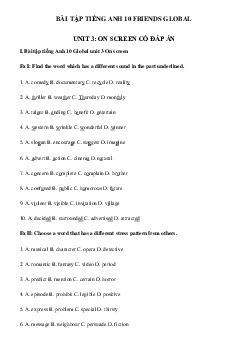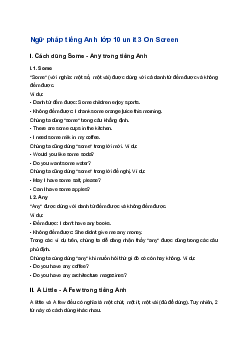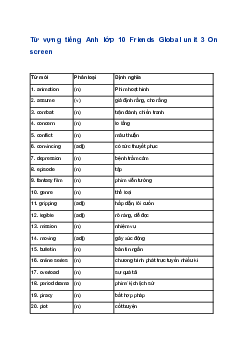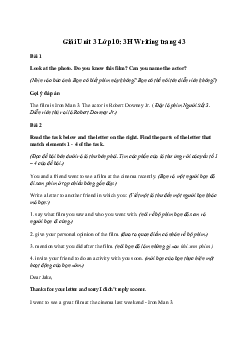






Preview text:
Giải Unit 3 Lớp 10: 3B Grammar trang 36 Bài 1
Work in pairs. Which of these different kinds of video games do you prefer? Give
an example of each kind. If you do not like any kind, say why?
(Làm việc theo cặp. Những thể loại trò chơi điện tử nào dưới đây mà bạn thích. Đưa
ra ví dụ cho mỗi loại? Nếu bạn không thích loại nào, hãy nói lí do tại sao?)
adventure city-building combat puzzle racing role-playing sports Gợi ý đáp án
I like playing city-building games such as SIM CITY and puzzle games.
(Tôi thích những trò chơi xây dựng thành phố như SIM CITY và những trò chơi giải đố.)
I don't like combat games because it's too violent. (Tôi không thích những trò chơi bắn
súng vì nó quá bạo lực.) Bài 2
Read the text. Does the game sound interesting to you? Why? / Why not?
(Đọc bài khóa. Tựa trò chơi trên có gây hứng thú cho bạn không? Tại sao? / Tại sao không?)
Anno 2070 is a video game set in the year 2070. Many cities are now under the ocean.
There aren't any countries or continents, but there are a lot of islands. Players have to
build new cities. There are two main groups of characters: the Tycoons and the Ecos.
As a player, you can choose to be in either group. Anno 2070 is not a combat game,
but there are a few conflicts between the two groups and there are some important
differences between them. The Tycoons build cities quickly and earn a lot of money.
But their lifestyle causes a lot of pollution, and there are not many trees or plants on
their islands. In contrast, the Ecos build 'green' cities but their progress is slow. They
don't use any coal or oil so there is not much pollution on their islands. The
inhabitants eat healthy food and even have a little time for some hobbies, like listening
to music. The aim of the game is to create your own world. How many cities can you
build? How much energy do they all need? Can you grow any food? Can you
complete any special missions? It depends how well you play the game! Dịch nghĩa
Anno 2070 là một tựa game đặt bối cảnh vào năm 2070. Nhiều thành phố bây giờ đã
chìm trong đại dương. Không còn các quốc gia hay châu lục, nhưng lại có rất nhiều
đảo. Người chơi phải xây dựng các thành phố mới. Có hai nhóm nhân vật: Tycoons và
Ecos. Là người chơi, bạn phải chọn một trong hai nhóm. Anno 2070 không phải là
một game bắn súng, nhưng vẫn có một vài sự xung đột giữa họ và có những sự khác
biệt to lớn giữa họ. Người Tycoons xây dựng các thành phố nhanh chóng và kiếm
được rất nhiều tiền. Nhưng lối sống của họ gây ra nhiều ô nhiễm, và cũng không có
nhiều cây trên những hòn đảo của họ. Ngược lại, người Ecos xây dựng những thành
phố “xanh” nhưng quá trình của họ lại chậm. Họ không dùng bất cứ loại than đá hay
dầu nào nên không có nhiều sự ô nhiễm trên những hòn đảo của họ. Những cư dân ăn
uống lành mạnh và có cả chút thời gian cho những sở thích, như nghe nhạc. Mục đích
của trò chơi là là tạo ra thế giới của chính bạn. Bạn có thể xây dựng bao nhiêu thành
phố? Sẽ cần bao nhiêu năng lượng cho tất cả chúng? Bạn có thể tạo ra thực phẩm
không? Bạn có thể hoàn thành bất cứ nhiệm vụ đặc biệt nào không? Điều đó dựa trên
bạn chơi game tốt như thế nào! Gợi ý đáp án
I'm quite interesting with this game because it mentions environmental issues which
are now hot news all over the world and I really want to try this game. (Mình khá
hứng thú với tựa game này vì nó nhắc đến vấn đề môi trường, hiện đang là câu
chuyện nóng bỏng trên khắp thế giới và mình rất muốn chơi thử game này.) Bài 3
Find examples of some and any in the text in exercise 2. Then complete the rules
in the Learn this! box.
(Tìm các ví dụ về “some” và “any” trong bài khóa trong bài tập 2. Sau đó hoàn thành
các quy tắc trong hộp Learn this!)
LEARN THIS! some and any
We use some and any with uncountable and plural countable nouns.
We use _____ in affirmative sentences.
We use _____ in negatives sentences and questions. Gợi ý đáp án
some: some important differences; some hobbies
any: any countries or continents; any coal or oil; any food; any special missions
LEARN THIS! some and any
We use some and any with uncountable and plural countable nouns. (Chúng ta dùng
some và any với những danh từ không đếm được và danh từ đếm được ở dạng số nhiều.)
We use some in affirmative sentences. (Ta dùng some cho câu khẳng định.)
We use any in negatives sentences and questions. (Ta dùng any cho câu phủ định và câu nghi vấn.)
(Tìm các ví dụ về “some” và “any” trong bài khóa trong bài tập 2. Sau đó hoàn thành
các quy tắc trong hộp Learn this!) LEARN THIS! some and any
We use some and any with uncountable and plural countable nouns.
a. We use _____ in affirmative sentences.
b. We use _____ in negatives sentences and questions. Lời giải chi tiết:
some: some important differences; some hobbies
any: any countries or continents; any coal or oil; any food; any special missions LEARN THIS! some and any
We use some and any with uncountable and plural countable nouns. (Chúng ta dùng
some và any với những danh từ không đếm được và danh từ đếm được ở dạng số nhiều.)
a. We use some in affirmative sentences. (Ta dùng some cho câu khẳng định.)
b. We use any in negatives sentences and questions. (Ta dùng any cho câu phủ định và câu nghi vấn.) Bài 4
Complete the sentences with some or any.
1. This game doesn't contain _____ violence at all.
2. I spent _____ time choosing a good game for my sister.
3. There are _____ well-known sports games, like the FIFA series.
4. Racing games often include _____ amazing special effects.
5. Twenty-five years ago, there weren't _____ 3D graphics.
6. Do you play _____ role-playing games? Gợi ý đáp án 1.any 2. some 3. some 4. some 5. any 6. any Bài 5
Look at the bold phrases and the nouns that follow them in the text in exercise 2.
Then complete the rules in the Learn this! box.
(Nhìn vào các cụm in đậm và danh từ theo sau chúng trong bài khóa trong bài số 2.
Sau đó hoàn thành các quy tắc trong hộp Learn this!)
LEARN THIS! not much, not many, a lot of. a little, a few
a. We use _____ or _____ + uncountable noun for a small quantity of something.
b. We use _____ or _____ + plural noun for a small number of something.
c. We use much + uncountable noun for a large quantity of something.
d We use many + plural noun for a large number of something.
e. We use _____ + uncountable or plural noun for a large quantity or number of something.
f. We use _____ …? + uncountable noun or _____ …? + plural noun for questions about quantity or number . Gợi ý đáp án
LEARN THIS! not much, not many, a lot of. a little, a few
a. We use not much or a little + uncountable noun for a small quantity of something.
(Ta dùng not much hoặc a little + danh từ không đếm được cho một lượng nhỏ của một thứ gì đó.
b. We use not many or a few + plural noun for a small number of something.
(Ta dùng not many hoặc a few + danh từ số nhiều cho số lượng nhỏ của một thứ gì đó.)
c. We use much + uncountable noun for a large quantity of something.
(Ta dùng much + danh từ không đếm được cho một lượng lớn của một thứ gì đó.)
d We use many + plural noun for a large number of something.
(Ta dùng many + danh từ số nhiều cho một số lượng lớn của một thứ gì đó.)
e. We use a lot of + uncountable or plural noun for a large quantity or number of something.
(Ta dùng a lot of + danh từ không đếm được hoặc danh từ số nhiều cho một lượng lớn
hoặc một số lượng của một thứ gì đó.)
f. We use how much …? + uncountable noun or how many …? + plural noun for
questions about quantity or number .
(Ta dùng how much…? + danh từ không đếm được hoặc how many…? + danh từ đếm
được cho câu hỏi về lượng hoặc số lượng.) Bài 6
Read the Look out! box above and the dialogue below. Circle the correct words
to complete the dialogue. Then listen and check.
(Đọc hộp chú ý! ở phía trên và đoạn hội thoại phía dưới. Khoanh tròn các từ đúng để
hoàn thành đoạn hội thoại. Sau đó nghe và kiểm tra.)
LOOK OUT! (Chú ý)
In affirmative sentences, much and many often sound very formal. In everyday English, we use a lot of.
(Trong các câu khẳng đinh, much và many nghe có vẻ trang trọng hơn. Trong tiếng
Anh hằng ngày, chúng ta dùng a lot of.)
Jack: Look, there's a building with (1) many / some people outside. Turn left just before you get there.
Evie: I can't see (2) any / some people. There isn't (3) many / much light. Hey! What's that noise?
Jack: Nothing. There was (4) any / some rubbish in the road.
Evie: I hate this part of town. There aren't (5) a few/ many nice areas. Let's go north.
Jack: How (6) many / much fuel have we got? Only (7) a few / a little litres.
Evie: Oh no, listen. The police are chasing us now.
Jack: Let me drive. I know (8) a few/ a little tricks.
Mum: Jack, are you doing (9) any / many homework in there?
Jack: Er ... Yes. We're doing (10) a little/ much IT homework.
Evie: Jack! That's not true ...
Jack: Well, we're spending (11) a lot of/ a few time on the computer!
Evie: But we aren't doing (12) some / any work! Gợi ý đáp án 1.some 2. any 3. much 4. some 5. many 6. much 7. a few 8. a few 9. any 10. a little 11. a lot of 12. any




